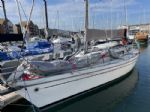




-(1)-202408140552.gif)






Boats for sale
| Rossiter Pintail Mortagne sur Gironde, near Bordeaux |
 |
| Laser 28 - Excellent example of this great design Hamble le rice |
 |
List classes of boat for sale |
In irons |
Post Reply 
|
Page <1234 5> |
| Author | |||||||
jeffers 
Really should get out more 

Joined: 29 Mar 04 Location: United Kingdom Online Status: Offline Posts: 3048 |
 Post Options Post Options
 Quote Quote  Reply Reply
 Topic: In irons Topic: In ironsPosted: 09 Mar 15 at 5:11pm |
||||||
|
Small claims court should cover most dinghy related damage (limit is £10k). Yachts are a whole different ball game though.
If you have fully comp insurance usually your insurance co will do the legwork to recover their costs from the other side. Hence the proliferation of the dreaded shared blame because the insurance co thinks it would not be worth their time to pursue the other side for full recovery (even when 1 side is blatantly in the wrong).
|
|||||||
|
Paul
---------------------- D-Zero GBR 74 |
|||||||
 |
|||||||
Brass 
Really should get out more 
Joined: 24 Mar 08 Location: Australia Online Status: Offline Posts: 1151 |
 Post Options Post Options
 Quote Quote  Reply Reply
 Posted: 09 Mar 15 at 10:41pm Posted: 09 Mar 15 at 10:41pm |
||||||
The issue Rupert was addressing was S was required to keep clear because she was moving astern by backing a sail under rule 22.3.
A boat 'drifting' does not get any special consideration under the rules. Only if a boat is capsized, anchored or aground (or trying to help a person or vessel in danger), does she get special consideration, and another boat is required, if possible, to avoid her under rule 23.
The rules analysis would be as follows. IF S had passed head to wind, even momentarily,
ELSE S has not passed head to wind
Rule 22.3 applies and S is required to keep clear ELSE22.3 A boat moving astern through the water by backing a sail shall keep clear of one that is not. Rule 10 applies IF S does not change course (not the case in this example) Rule 10 applies without limitation and P is required to keep clear. ELSE S changes course (a boat that was moving ahead, then moves astern, changes course by 180 degrees) S is required to give P room to keep clear under rule 16, and specifically rule 16.2 applies 16 CHANGING COURSE16.1 When a right-of-way boat changes course, she shall give the other boat room to keep clear.16.2 In addition, when after the starting signal a port-tack boat is keeping clear by sailing to pass astern of a starboard-tack boat, the starboard-tack boat shall not change course if as a result the port-tack boat would immediately need to change course to continue keeping clear. IF there was no contact S would normally be taken to have given P room to keep clear and P kept clear: no rule was broken.ELSE there was contact IF P did all she could in a seamanlike way to keep clear (or, in this case, needed to further change course immediately after S began changing course by moving astern) S did not give P room to keep clear, and S broke rule 16.Notwithstanding S breaking rule 16, P also broke rule 10, but because S did not give P room to keep clear, she compelled P to break rule 10, and P is exonerated for breaking rule 10 in accordance with rule 64.1( a ) Rule 14 (avoiding contact) is also relevant.(a) when as a consequence of breaking a rule a boat has compelled another boat to break a rule, the other boat shall be exonerated.
|
|||||||
 |
|||||||
GML 
Groupie 
Joined: 24 Jul 11 Online Status: Offline Posts: 94 |
 Post Options Post Options
 Quote Quote  Reply Reply
 Posted: 09 Mar 15 at 10:54pm Posted: 09 Mar 15 at 10:54pm |
||||||
|
All of which I agree with Brass, but if P didn't hail "Protest" (and display a red flag if required), and then submit a written protest within the protest time limit, it is all pretty moot since there isn't a valid protest. And without a protest committee decision in his favour I don't hold out much hope of P getting any contribution to the cost of repairing his damage from S (who may well claim that he saw the incident differently), and he may have problems with his insurance company too.
Key message - if you want to protect yourself, protest!
|
|||||||
 |
|||||||
Brass 
Really should get out more 
Joined: 24 Mar 08 Location: Australia Online Status: Offline Posts: 1151 |
 Post Options Post Options
 Quote Quote  Reply Reply
 Posted: 10 Mar 15 at 2:29am Posted: 10 Mar 15 at 2:29am |
||||||
Yes, as JimC said, that is a convenient way of getting a written decision, in accordance with the RRS to support an insurance claim or claim for damages.
Not really any more difficult than proving the case in a protest hearing. Collecting and presenting evidence, witnesses etc may now be a little more inconvenient and costly, and the liklihood of an insurer or magistrate correctly applying the RRS may be a little diminished, but without a written protest decision following a valid protest, that's a problem P has brought upon himself.
We need to be very careful here. The RYA Prescription to rule 67 says This does not cover a boat that neither takes a penalty nor retires, but is penalised in a protest hearing. A protest committee in a protest hearing may make a finding of fault, namely that a boat broke one or more of the RRS, and, within the bounds of the results of a race or series award a penalty as provided by the RRS, but the RRS do not facilitate any determination of liability to pay money damages, and our MNA prescriptions tell us that a protest committee should not attempt to do so. So a protest decision is a step along the way to deciding liability to pay damages, but it does not, itself, decide liability.
Yes, you would normally expect that.
Well, those would be opinions about the facts and the application of the RRS to those facts. What is now needed, in advancing a claim either to an insurer or directly against the other boat is to:
Some of those things will be disputed between the parties ('did not/did so'), and some will, either expressly or by default, be agreed.
Evidence of eyewitnesses will usually help to decide facts in contention. That evidence could be presented to an insurer in the form of a written statement, or in a court by a witness attending and giving testimony.
Probably, but AIUI, the Small Claims jurisdiction is designed to enable parties to present their case without legal assistance and costs. Edited by Brass - 10 Mar 15 at 3:53am |
|||||||
 |
|||||||
Brass 
Really should get out more 
Joined: 24 Mar 08 Location: Australia Online Status: Offline Posts: 1151 |
 Post Options Post Options
 Quote Quote  Reply Reply
 Posted: 10 Mar 15 at 3:52am Posted: 10 Mar 15 at 3:52am |
||||||
Indeed you might be able to enlist the good offices of club officers or other respected intermediaries. BUT, the whole point of rule 67 and the RYA prescriptions to it are that clubs should absolutely avoid getting involved in legal disputes between racers. Bear in mind that from an RRS point of view, the incident, in the absence of a valid protest doesn't even exist. A party has an absolute right to sit pat until such time as he is properly served with a legal process (there may be consequences of doing so if the party eventually loses, but that's another matter). It would be madness to run a rule 69 on the issue as you have described it.
|
|||||||
 |
|||||||
Brass 
Really should get out more 
Joined: 24 Mar 08 Location: Australia Online Status: Offline Posts: 1151 |
 Post Options Post Options
 Quote Quote  Reply Reply
 Posted: 10 Mar 15 at 4:12am Posted: 10 Mar 15 at 4:12am |
||||||
There is no reason whatever to think that a claim by P against S for damages is 'moot'. P has every right to initiate such a claim and have it decided according to law. True, P, by not validly protesting, has forfeited the convenience of having a written protest decision to support such a claim, but P can still pursue an action 'from first principles'. Indeed, there are always two sides to any story, and S might successfully defeat P's claim by disputing facts, or the application of the rules, but 'failure to protest' would be a wholly irrelevant consideration. I am not aware of any insurance policy that makes a valid protest a condition for indemnity.
|
|||||||
 |
|||||||
jeffers 
Really should get out more 

Joined: 29 Mar 04 Location: United Kingdom Online Status: Offline Posts: 3048 |
 Post Options Post Options
 Quote Quote  Reply Reply
 Posted: 10 Mar 15 at 6:44am Posted: 10 Mar 15 at 6:44am |
||||||
Neither am I but it is a question that I have been asked when a claim is made after a racing incident. Whilst the protest result itself is not (and cannot be) an admission of liability the insurance company will use the facts found and decision as a basis for their assigning of liability.
|
|||||||
|
Paul
---------------------- D-Zero GBR 74 |
|||||||
 |
|||||||
Brass 
Really should get out more 
Joined: 24 Mar 08 Location: Australia Online Status: Offline Posts: 1151 |
 Post Options Post Options
 Quote Quote  Reply Reply
 Posted: 10 Mar 15 at 6:58am Posted: 10 Mar 15 at 6:58am |
||||||
It's perfectly reasonable for an insurer to ask for a written protest decision if there is one: it's an independent finding of facts and application of the RRS by a protest committee that should be expected to have a better knowledge of the RRS than an insurance assessor. The degree to which insurers are prepared to rely on written protest decisions varies.
|
|||||||
 |
|||||||
fudheid 
Far too distracted from work 

Joined: 21 Apr 11 Location: 51.53 N 01.28 E Online Status: Offline Posts: 241 |
 Post Options Post Options
 Quote Quote  Reply Reply
 Posted: 10 Mar 15 at 10:59am Posted: 10 Mar 15 at 10:59am |
||||||
|
in the few incidents i have had that have led to insurance claims, there is no need for a protest decision. The insurance companies we dealt with (noble/towergate/bishop skinner?)
took action on colregs and who was to blame for the damage not who is to blame under the RRS. in a port starboard collision the costs were split as the RoW boat chose to make contact i.e took no avoiding action..... |
|||||||
|
Cheers you
only me from over the sea...... |
|||||||
 |
|||||||
GML 
Groupie 
Joined: 24 Jul 11 Online Status: Offline Posts: 94 |
 Post Options Post Options
 Quote Quote  Reply Reply
 Posted: 10 Mar 15 at 5:54pm Posted: 10 Mar 15 at 5:54pm |
||||||
You are right of course Brass - I was looking at the issue too narrowly.
|
|||||||
 |
|||||||
Post Reply 
|
Page <1234 5> |
| Forum Jump | Forum Permissions  You cannot post new topics in this forum You cannot reply to topics in this forum You cannot delete your posts in this forum You cannot edit your posts in this forum You cannot create polls in this forum You cannot vote in polls in this forum |
Bulletin Board Software by Web Wiz Forums® version 9.665y
Copyright ©2001-2010 Web Wiz
Change your personal settings, or read our privacy policy
Copyright ©2001-2010 Web Wiz
Change your personal settings, or read our privacy policy











 Printable Version
Printable Version Delicious
Delicious Digg
Digg Facebook
Facebook Furl
Furl Google
Google MySpace
MySpace Newsvine
Newsvine reddit
reddit StumbleUpon
StumbleUpon Twitter
Twitter Windows Live
Windows Live Yahoo Bookmarks
Yahoo Bookmarks Topic Options
Topic Options